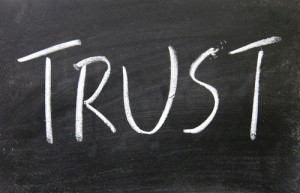 As one very sage philosopher wrote, “mutual trust is the firmest building block in human relationships. Without it, the whole structure comes down.” For anyone who has experienced the breaking of trust with another human being, he or she knows how true that piece of wisdom is.
As one very sage philosopher wrote, “mutual trust is the firmest building block in human relationships. Without it, the whole structure comes down.” For anyone who has experienced the breaking of trust with another human being, he or she knows how true that piece of wisdom is.
More about Trust
Trust is essentially the belief you have that someone or something is reliable, good, or honest. It is a feeling of confidence you have in another that shows you believe they are honest and fair and reliable; the believing in the honesty and reliability of others. It is an ancient word that dates back to the 1200’s, first recorded in the Old Norse language, and meaning help, confidence. Those many hundreds of years ago, just as it is now, trust is highly valued by human beings. When a person can be trusted, he or she is considered valuable. When a person loses trust, he or she can be considered almost worthless.
A person earns the trust of others by demonstrating the fact that he or she is worthy of that trust. A trustworthy person keeps his or her word once given. That includes the person doing what he or she says they are going to do, as well as not doing something he or she gave their word they will not do. Because of the nature of human beings and interpersonal relationships, it is a sad fact that when a person breaks their word, he or she may not be given another chance. Again, that same very sage philosopher wrote that the most thorough self-exile there is, is to “fail to keep one’s promises once made.”
Being worthy of trust is actually the adherence to and following of a moral code of conduct, one generally accepted in our society and our culture at large. Unfortunately, when an individual falls away from the moral code he or she followed before becoming involved in substance abuse and its lifestyle, that person will adopt a different code of conduct, that of the druggie–the addict.
The Reality of Drug Use
One of the first assets a substance abuser loses is the trust of other people. Drug users and addicts routinely deal in lies, broken promises, deceit, theft, excuses, unreliability—all of which destroy trust rather than build it. It can take just one time of such misconduct for a lifetime of trust to be broken and destroyed. And it is the very nature of drugs and their effects on a human being which creates a drug-induced and false personality that is the antithesis of those qualities of human nature which are desired and valuable to self and others. But just as a person can fall prey to drugs and become something he or she is truly not, that same person can break free from the chains of their addiction, and can decide to restore themselves to their former condition. A person can do what it takes to once again earn the trust of others.
There is Hope
Trust is restored by demonstrating the actions that earn it. Once again earning trust and being regarded as a trustworthy person would actually be a vital part of the true rehabilitation of a drug addict. Rehabilitation is far more than just the quitting of the drugs. Rehabilitation includes the restoration of self, the restoration of damaged relationships, the rebuilding of trust with one’s family and fellows, and the decision to follow and abide by a moral code which includes honesty, the keeping of one’s word once given, not taking harmful drugs, not doing anything illegal, and being worthy of trust.
For more information on a drug rehabilitation program that truly rehabilitates the addict, please visit Narconon Arrowhead today.
For more information on a commonsense moral code that any individual use to create a better life for themselves and others, please visit The Way to Happiness.